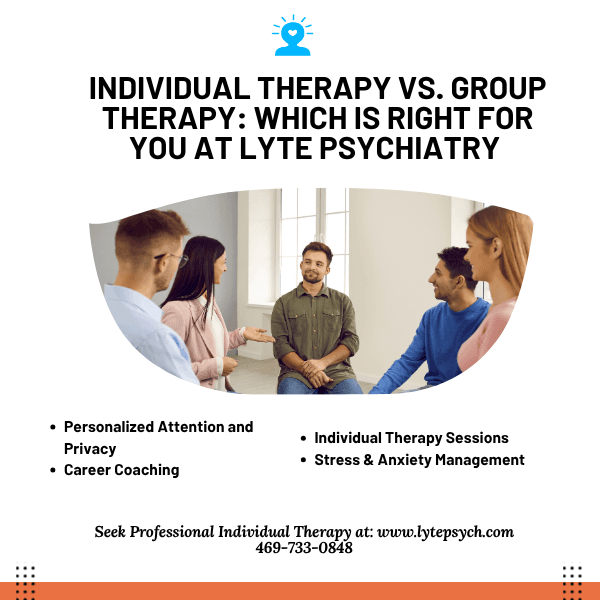Thu Nov 13 2025
Individual Therapy vs. Group Therapy: Which Is Right for You at Lyte Psychiatry (Affordable Therapist and Psychiatrist Near You) Dallas & Arlington,TX

Individual Therapy vs. Group Therapy: Which Is Right for You at Lyte Psychiatry?
Learn the key differences between individual and group therapy at Lyte Psychiatry in Dallas. Discover therapy types, insurance options, and flexible hybrid care. Book your session today.
Understanding Therapy Options at Lyte Psychiatry
Mental health care is not one-size-fits-all. Whether you’re managing anxiety, depression, trauma, or stress, the right therapeutic setting can make all the difference. At Lyte Psychiatry in Dallas, patients can choose between individual therapy and group therapy two evidence based approaches that support healing and personal growth in different ways.
Both forms of therapy share the same goal: helping you understand your thoughts, emotions, and behaviors to create meaningful change. However, how you achieve that growth may depend on your personality, goals, and comfort level.
Let’s explore each option in depth and help you determine which therapy path may be best for you.
Benefits of Individual Therapy
Individual therapy, sometimes referred to as one-on-one counseling, provides a confidential space to explore personal issues in depth with a licensed therapist. Sessions are typically 45–60 minutes and focus entirely on your goals, pace, and experiences.
Key Benefits:
Personalized Attention and Privacy: You receive undivided attention from your therapist, allowing for tailored treatment plans specific to your symptoms, history, and preferences.
Deeper Emotional Exploration: Private sessions create a safe space to process sensitive topics such as trauma, loss, or relationship struggles without judgment.
Flexible Pacing and Focus:: The therapist adjusts the pace, intensity, and focus areas depending on your progress and comfort level—something group settings can’t always offer.
Stronger Therapeutic Alliance The one-on-one relationship fosters trust, accountability, and insight, which can be crucial for individuals struggling with anxiety, depression, or trauma related conditions.
Statistic: According to the National Alliance on Mental Illness (NAMI), nearly 1 in 5 U.S. adults live with a mental health condition, yet less than half receive treatment. Individual therapy is one of the most effective, evidence-based ways to close this gap.
When to Choose Individual vs. Group Therapy
Both therapy models can be effective what differs is how they help you.
Individual Therapy May Be Better If:
You’re experiencing intense or complex emotions (e.g., trauma, grief, mood swings).
You need to work on personal or private issues that are difficult to discuss in a group.
You prefer a customized approach and a stronger therapist-client bond.
You’re beginning treatment and need an initial foundation before joining a group.
Group Therapy May Be Better If:
You want peer support and to learn from others’ experiences.
You’re working on social skills, communication, or interpersonal boundaries.
You want to reduce isolation and realize you’re not alone in your challenges.
You’re looking for cost-effective care, as group therapy sessions are often less expensive and covered by most insurance plans.
Types of Individual Therapy Offered at Lyte Psychiatry
At Lyte Psychiatry in Dallas, our clinicians provide several evidence-based modalities under the umbrella of individual therapy. Each method is chosen based on your diagnosis, goals, and treatment response.
1. Cognitive Behavioral Therapy (CBT)
2. Dialectical Behavior Therapy (DBT)
Combines cognitive techniques with mindfulness and emotion regulation strategies. Effective for individuals dealing with intense emotions, self-harm tendencies, or borderline personality traits.
3. Eye Movement Desensitization and Reprocessing (EMDR)
A trauma-focused approach that helps reprocess distressing memories and reduce their emotional intensity. EMDR is particularly beneficial for PTSD, phobias, and chronic anxiety.
4. Psychodynamic and Supportive Therapies
Explore past experiences, relationships, and unconscious conflicts to improve self-awareness and emotional insight.
Insurance Acceptance for Individual Therapy
Lyte Psychiatry accepts most major insurance providers for individual therapy and psychiatric services. Our administrative team assists patients in understanding their mental health benefits before treatment begins.
For patients without insurance, self-pay and sliding-scale options are available, ensuring accessibility for all who seek care.
Hybrid Service Model: In-Person and Virtual Flexibility
Lyte Psychiatry offers a hybrid care model, giving you the choice between in-person therapy sessions at our Dallas clinic or virtual appointments from the comfort of your home.
Benefits of the Hybrid Model:
Convenience: Attend therapy from anywhere in Texas via secure telehealth platforms.
Continuity: Maintain consistent progress even during travel or schedule changes.
Accessibility: Ideal for individuals with mobility challenges, busy professionals, or those living outside the Dallas area.
Privacy: Enjoy the same confidentiality standards whether online or in-office.
Both formats deliver the same evidence-based quality of care, so you can choose the setting that best fits your lifestyle and comfort level.
Book Your Individual Therapy Session Today at Lyte Psychiatry (Affordable Therapist and Psychiatrist Near You)
Our licensed therapists use proven methods like CBT, DBT, and EMDR to help you gain insight, improve coping skills, and achieve lasting emotional balance all within a flexible hybrid care model.
Take the first step toward better mental health. Book your individual therapy session today at Lyte Psychiatry in Dallas available in-person or virtually. Your journey to emotional wellness begins with one conversation.
Frequently Asked Questions (FAQ)
Q: How long does individual therapy last?
A: Most individuals attend therapy weekly for 8–20 sessions, depending on their needs and goals.
Q: Can I combine individual and group therapy?
A: Absolutely. Many patients find that combining both offers the benefits of personal insight from individual sessions and community support from group therapy.
Q: Is virtual individual therapy effective?
A: Yes. Studies show telehealth therapy is just as effective as in-person care for most mental health conditions.
Q: Will my insurance cover therapy sessions?
A: Most major insurance plans do. Lyte Psychiatry will verify your coverage before your first appointment.
Q: What if I’m nervous about starting therapy?
A: Feeling nervous is completely normal. Your therapist will guide you through each step at your pace and help create a comfortable, judgment-free space for healing.